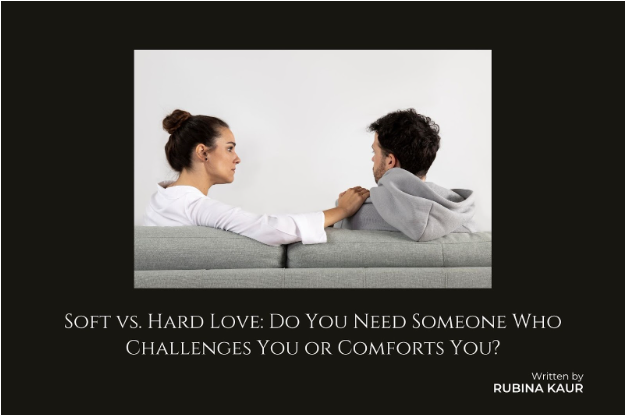








When it comes to relationships, we often picture love as warm, tender, and nurturing, the kind that wraps you in comfort after a long day. But love isn't always soft. Sometimes, it's tough, direct, and even uncomfortable, yet it shapes us into stronger, more self-aware individuals. This is where the debate between soft love and hard love comes in.
The truth is, both forms of love serve a purpose. The question isn't whether one is better than the other, but rather which type of love do you need most at this point in your life?
Soft love is the nurturing side of relationships. It feels like a safe haven where you can put down your armor and simply be. It is expressed through:
Think of soft love as the emotional blanket that keeps you warm when life feels cold. It doesn't demand change it offers support and unconditional care.
For many people, especially those who have gone through hardships or trauma, soft love feels like medicine. It gives them the space to heal and rebuild their sense of self-worth.
Hard love is often misunderstood. It doesn't mean cruelty or harsh criticism. Instead, it's a love that pushes you toward growth, even if it's uncomfortable. It shows up in ways like:
Hard love is like a personal trainer for the soul. It's not always pleasant in the moment, but over time, it helps you level up emotionally, mentally, and even spiritually.
If you're in a season of healing, recovering from past toxic relationships, or struggling with self-worth, soft love can feel like a lifeline. You may not be ready for someone to constantly challenge you, you first need to feel safe and seen.
Soft love creates stability, helping you trust again. It teaches you that love doesn't have to hurt or demand constant proving of your worth. For people who grew up in chaotic environments or have faced constant criticism, this gentle form of love can be deeply transformative.
On the other hand, if you've been too comfortable for too long, you might crave a partner who challenges you. Hard love keeps you accountable, helping you break out of unhealthy patterns or limiting beliefs.
Maybe you've avoided difficult conversations in the past, or perhaps you tend to settle for less than what you deserve. A partner who practices hard love won't let you stay stagnant. They will challenge you to grow, to communicate, and to face uncomfortable truths that ultimately set you free.
The healthiest relationships often hold a balance between soft and hard love. Too much soft love may feel like comfort without progress you feel safe, but you don't grow. Too much hard love can feel draining or harsh, as though love is conditional on constant improvement.
True partnership often weaves both together:
It's this balance that makes love both healing and transformative.
Ask yourself:
Your answer might shift depending on where you are in life. And sometimes, the same person can give you both comfort when you need it and challenge when you're ready for it.
There's no right or wrong when it comes to soft vs. hard love. Both are valid, both are powerful, and both can transform you in different ways. The key is knowing yourself well enough to understand what your heart craves right now.
Love, at its core, isn't just about what feels good it's about what helps you become the fullest version of yourself. Whether that comes through soft nurturing or tough guidance, the journey is yours to choose.
Whether you're struggling with communication, seeking deeper understanding, or want to build healthier relationship patterns, professional support can help. Contact us to learn more about our relationship counseling and therapy services.
If this article resonated with you, share it with others who might benefit from these insights.